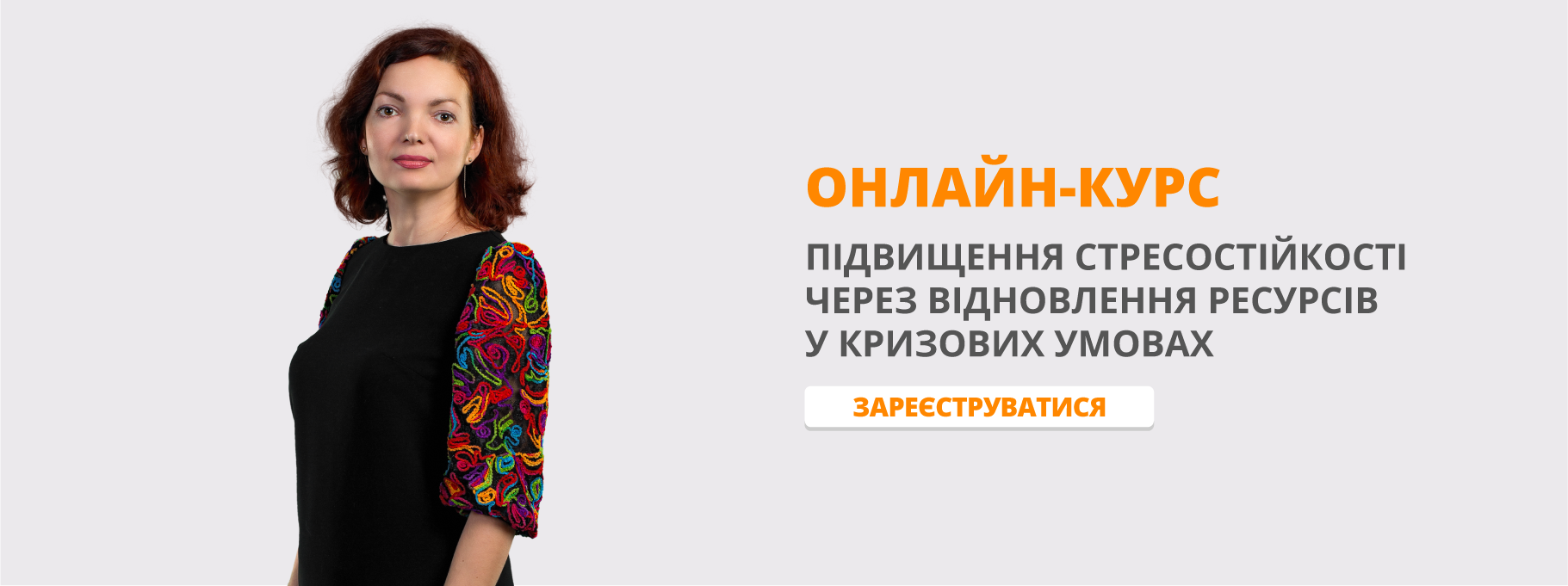Шкільне життя в Україні та Великобританії 8 клас англійська мова
Шкільне життя в Україні та Великобританії
8 клас англійська мова
(урок комплексного застосування знань, умінь та навичок)
Учитель вищої кваліфікаційної
категорії, старший учитель
Карлівської ЗОШ І – ІІІ ст. № 3
Ніколаєнко Олена Анатоліївна

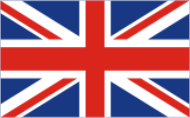
Тема уроку: Шкільне життя в Україні та Великобританії
Мета уроку:
- навчальна – удосконалювати навички усного та писемного мовлення, читання, аудіювання; вчити аналізувати отриману інформацію; систематизувати граматичний матеріал.
- розвивальна – розвивати уміння робити зіставлення, висловлювати свою думку, збагатити словниковий запас.
- виховна – виховувати розуміння важливого значення освіти та оволодіння іноземною мовою і потреби користуватися нею, як засобом
спілкування, виховувати повагу до школи.
Тип уроку: урок комплексного застосування знань, умінь, навичок.
Обладнання: презентація, асоціативні схеми, роздавальний матеріал,мікрофон, географічні карти .
Методи і прийоми навчання: робота в групах, сенкан, асоціація, мікрофон, гра, порушення послідовності, вікторина.
Хід уроку:
- Підготовка до іншомовного спілкування.
- Привітання
T: Good morning everybody! Good morning students!
P-s: Good morning! Good morning!
Good morning to you!
Good morning our teacher!
We are glad to see you!
We’ve got many guests at the lesson. Greet them, please.
- Мовленнєва розминка (слайд 1)
Т: Tell me-I forget,
Show me- I remember,
Involve me-I understand. (Залучати)
- Уведення в іншомовне середовище
T: Look at the screen and match the beginning of the proverb in column A with its ending in column B(слайд 2,3)
|
Match the beginning of the proverb in column A with its ending in column B. |
|||
|
1. |
Live and… |
A. |
…a dangerous thing. |
|
2. |
Knowledge is… |
B. |
…to learn. |
|
3. |
A little knowledge is… |
C. |
…power. |
|
4. |
It is never too late… |
D. |
…to know nothing. |
|
5. |
To know everything is… |
E. |
… learn. |
|
6. |
There is no royal road… |
F. |
…to learning. |
|
The answer key: 1-E, 2-C, 3-A, 4-B, 5-D, 6-F. |
|||
- Повідомлення теми та мети уроку(слайд4)
T. So, today we’ll discuss a very important topic “Education in Ukraine and Great Britain”. We’ll know what is different and what is common in the system of education in these countries.
Word Association: (слайд 5)
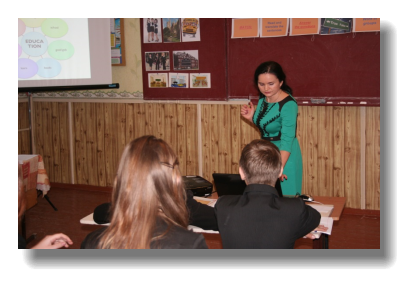 Boys and girls, what words are associated in your mind with the word “education”?
Boys and girls, what words are associated in your mind with the word “education”?
P1: Study
P2: School
P3: university
P4: good job
P5: career
P6: books
P7: learn
P8: knowledge
(The words are shown on the screen)
T: Make up your own sentences with these words: (1, 2-3 minutes for preparing) Students write in their copy-books. Are you ready?
P1: My future depends on my studying in school.
P2: To enter the university you have to pass Independent Testing successfully.
P3: You should work hard to make a good career in future.
P4: Books is a source of knowledge .
P5: Good job must bring, not only high salary but also satisfaction.
P6: I can’t but say the proverb.
“Live and Learn”
P7: And I’d like to continue your thought using another proverb.
“Knowledge is Power”
- Основна частина уроку
1. Аудіювання
Pre-listening task
T:Answer the questions.
- What do you know about British schools?
- What is common between your school and British schools?
-
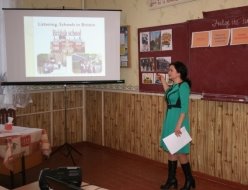 What do you like at British school life?
What do you like at British school life?
- What compulsory subjects do you study at your school?
- What do you think of your classmistress?
Listening(слайд 6)
The school year in Britain starts in September. The lessons last 40-45 minutes. British pupils wear a school uniform. The favourite colours are blue, grey, black and green. The first foreign language they learn at school is French. Sometimes they also learn a second foreign language: German, Spanish. British students have ten days at Christmas and Easter holidays and six weeks in the Summer. Schools also have special half-term holidays in the middle of each term.
Schools in England and America use their own marks: letters or percentage A -excellent , B – good, C – satisfactory, D – bad, E – poor.
In most English schools forms start only at the secondary school, at the age of eleven. So at the age of twelve British students go to the second form. At the age of twelve Ukrainian students go to the sixth form.
The school day starts with assembly. All schools organise a short daily meeting for the whole schools to give important information .
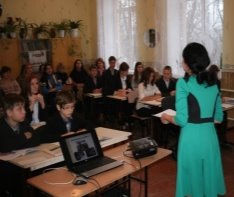 The five minutes between lessons is not a break. Pupils must use this time to move quickly to the next lesson. During the lunch hour pupils have time to do many things besides eating. They can also read in the library, participate in clubs or sport, and go home.
The five minutes between lessons is not a break. Pupils must use this time to move quickly to the next lesson. During the lunch hour pupils have time to do many things besides eating. They can also read in the library, participate in clubs or sport, and go home.
Post-listening task(слайд 7)
T: Mark the following statements true or false.
- School day starts with assembly.
- British pupils go to school on Saturday.
- There are schools only for boys and only for girls in Britain.
- Children of your age can go to a grammar school in England.
- A school year in Britain has four terms.
- Each term is divided into two half-terms.
- The marking system in Britain is similar to that in Ukraine.
- Science includes chemistry, physics, biology and mathematics.
- Pupils can eat lunch in the school canteen.
- British students have ten days at Christmas and Easter holidays
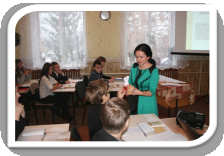 2.Гра «Guess the room», «Guess the subject».
2.Гра «Guess the room», «Guess the subject».
T: Let us do the next task in groups.
Group 1
- Books, newspapers, magazines are kept there. You go there to borrow or read books. (A library)
- A room where you have lessons at school. (A classroom)
- Meetings, performances, gatherings and parties are held in it. (An assembly hall)
- A place where you can watch sports matches. (A stadium)
- A room where you do exercises for your body. (A gymnasium)
- A room where you can eat sandwiches and drink tea or juice during the break. (A canteen)
- A room for teachers and class registers. (A teachers’ room)
Group 2
1. You do a lot of experiments during this lesson (Chemistry).
2. You read books, stories and poems by different authors and discuss them (Literature).
3. You use calculators to do the tasks at this lesson (Math).
4. Before this lesson you warm up and then run and jump in the gym (Physical Training).
5. You learn a lot of facts about different countries (Geography).
6. At this lesson you learn about kings and queens (History).
7. You draw portraits and make different things during this lesson (Art).
3. Читання. Технологія «Порушення послідовності»
Pre-Reading.
T:Answer the questions.
1. Which school do you study at?
2. How many lessons have you got a day?
3. What compulsory subjects do you study at school?
4. Are you good at all of them?
5. What is your favorite subject? Why?
Reading
T: Read the text and put the paragraphs( A-F ) in the correct order.
SCHOOLS IN UKRAINE
A My name is Irene and I’d like to tell you about schools in Ukraine.
The right to education in Ukraine is guaranteed by the Constitution (Article 53).
Every boy or girl must get secondary education; it means that secondary education is compulsory in our country. There are state schools where education is free of charge and private schools where pupils have to pay for their studies.
B I live in Poltava. I study at a secondary school. My school was built more than twenty years ago. When I was ten I left primary school and went to a secondary one.
C Now I am thirteen and I am a pupil of the eighth form. We go to school from Monday to Friday. We usually have six or seven lessons a day.
D Every school has a core curriculum and a school curriculum. The core curriculum includes such subjects as Maths, Ukrainian and World Literature, Physics, History, Geography, English, German, Ukrainian and Russian Languages and other subjects.
E According to the school curriculum we can choose extra subjects such as Computer Studies, Psychology, Economics, and Ethnography.
We’ve got Art, Music and Physical Training. I am good at all of them.
F Lessons begin at 8 a.m. and last to 1 or 2 p. m. We have some breaks for lunch and rest. Teachers give us home tasks after each lesson.
Answers: A, B, C, D, E, F.
Post- Reading tasks. (слайд 8,9)
T: Test yourselves. Which statements refer to schools in Ukraine (U) and which ones to schools in Britain (B).
|
##№ |
|
PPuuPt U or B |
|
1. |
There are three terms: Autumn, Spring and Summer.
|
B |
|
2. |
The right to education is guaranteed by the Constitution. (Article 53) |
U |
|
3. |
Every school has a core curriculum and a school curriculum. |
U |
|
4. |
Pupils can eat lunch in the school canteen. |
B |
|
5. |
Children have 5 lessons in the morning and 2 after lunch. |
B |
|
6. |
Lessons begin at 8 a.m. and last to 1 or 2 p. m. |
U |
|
7. |
Schools use their own marks. |
B |
|
8. |
One of the subjects is Ethnography. |
U |
|
9. |
The school day starts with assembly. |
B |
|
10. |
Teachers give us home tasks after each lesson. |
U |
4. Письмо (слайд 10)
T: As you know there are four kinds of questions in English grammar .Put all kinds of questions to the sentence:(general, special, alternative, disjunctive).
Pupils study a lot of subjects at school.
5. Вікторина
T: And now I’d like to see what you know about education in Great Britain and in Ukraine. So, answer my questions, please.
QUIZE
- When do children go to Infant schools in England? (At 5)
- What do schoolchildren do in junior schools? (Read, write, do sums)
- What is pre-school education provided by? (Kindergartens)
- How many terms are there at English schools? ( 3)
- School uniform in England becomes more popular, doesn't it? (Yes)
- What are the main types of British schools? (State and private)
- How many subjects, which are compulsory does the national curriculum consist of? (10)
- Is a foreign language a compulsory subject for all British pupils in all forms? (Yes)
- When is secondary education compulsory for children in Great Britain? (From 5 to 16)
- How many days of- holidays do English children usually have? (10)
- Сенкан
T:Make a cinquain with the word Education. (слайд 11)
- іменник – тема– topic
- два прикметники– two adjectives
- три дієслова– three verbs
- цікава інформація– a sentence
- синонім - a synonym to the topic
Education (слайд 12)
Useful, interesting
Teach, learn, study
I get new information.
Knowledge
ІІІ. Заключна частина уроку. (слайд 13)
1. Підведення підсумків уроку. Рефлексія.
T: You worked really hard. You realized the differences of the systems of education, you are ready to improve our schooling. Now I want you to sum up the lesson.
Інтерактивна вправа «Мікрофон»
At the lesson
I learned…
I understood…
My best success was…
I had difficulties with…
I couldn’t… but I can now.
I changed my attitude to…
(оцінювання роботи учнів)
2.Пояснення домашнього завдання.
-Write a composition “ If I were…( anybody you choose)
Thank you for your work.
The lesson is over. Good bye.
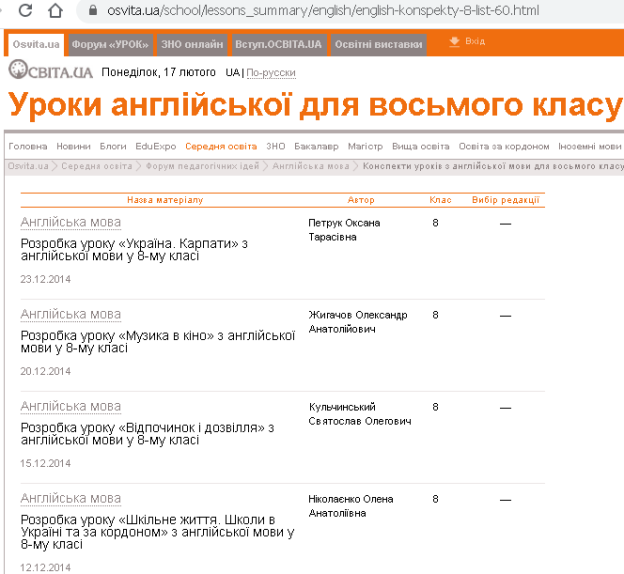


про публікацію авторської розробки
Додати розробку
